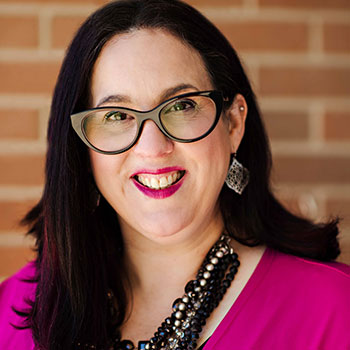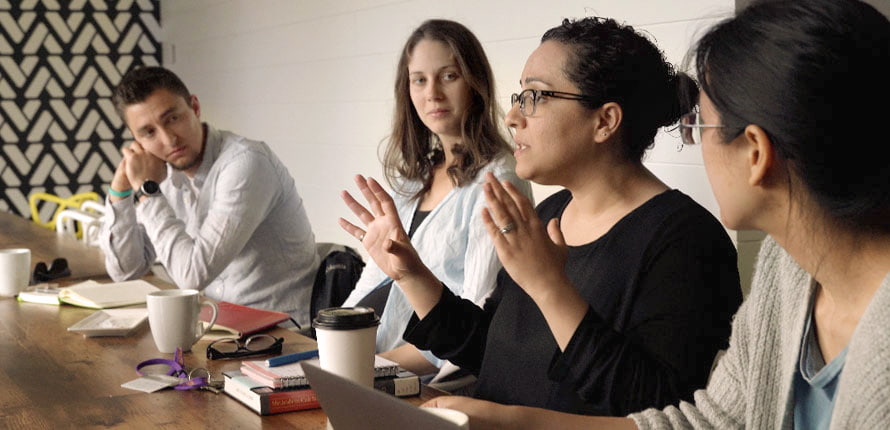"Immerse yourself in all Laurier has to offer while completing your graduate education. Enjoy the journey – remember to have fun too!"
Paula C. Fletcher, associate dean, Faculty of Graduate and Postdoctoral Studies
Search for academic programs, residence, tours and events and more.
Our Master of Arts (MA) in Psychology faculty members have a wide range of research experience. The program is offered within three fields of study: Community, Developmental and Social Psychology.

Close mentorship with faculty.
Community engagement.
Hands on, diverse research experiences.
In our Community Psychology field, you’ll gain valuable work experience as a community consultant through our practicum placement. You’ll spend 200 hours in your practicum placement learning important practical skills as you critically reflect on your practicum experience using an Action, Theory, and Research (ART) model.
In community psychology, we’ll teach you to take a value-based, action-oriented and ecological approach to your research – focusing not only on the individual, but also on the social, physical and community environment in which that individual lives.
In developmental and social psychology, we believe that great researchers are trained in a supportive learning environment. As soon as you start either of these program fields, you’ll begin conducting research with a faculty adviser in your first year.
Over the course of two years, with the close mentorship of your adviser, you’ll learn how to develop a research program, how to use new research methodologies and statistical techniques, and how to communicate your research like an expert. You’ll generate new research that can advance basic knowledge in psychology, and you may have the opportunity to present your research at national or international conferences.
You’ll form close bonds with faculty and peers through small, intensive courses, research lab groups, and regular area meetings including seminars and journal clubs.
This full-time program is normally completed in two years (six consecutive terms). Program requirements vary by field.
Community psychology is a critical and applied social science that pursues action-oriented social justice research from a perspective of understanding human behaviour in its social and historical contexts. Community psychologists recognize the communities they work with as experts on their own situations and as integral partners in designing and implementing culturally appropriate interventions that foster sustainable wellbeing. Community psychologists base their interventions on theory and evidence and use action-oriented research to promote positive change.
Community psychology takes a holistic approach to promoting social justice and wellbeing by focusing on the community, environment, and larger influencing factors that affect people’s daily lives (culture, society, politics, economics, etc.). It's characterized by an ecological approach to social problems that considers the conditions which give rise to them, such as experiences of poverty, oppression, marginalization and stigma. It links research and evaluation with direct action and service, and its practitioners partner with community members and social institutions to promote change.
Having a community psychology degree demonstrates that you have a professional commitment to lasting social change, an understanding of the origins of socially constructed problems, and the training to help others face those issues completely and successfully.
The Master of Arts (MA) in Psychology with a concentration in Community Psychology requires six half-credit courses, a practicum, and a thesis.
This program offers theory, research and skills development, as well as supervised real-world application of those skills through a 200-hour practicum (field work) placement in a community, organizational, and/or government setting.
You'll have the opportunity to learn about social issues and effective change strategies and to assist with undergraduate classes as a Teaching Assistant. You'll conduct applied, action-oriented research on a topic of your choice in the form of a thesis under the supervision of one of our faculty members.
This field is geared to prepare graduates for a variety of positions in governmental and non-governmental settings related to community development and engagement, community-based research and evaluation, and social change, as well as for further graduate work.
The community practicum courses are a significant part of this program's curriculum requirements. You're required to complete 200 hours of supervised practicum work in an agency of your choice, where you'll gain valuable experience as a community consultant and transformative social and organizational change agent. The practicum experience is accompanied by a two-semester practicum course where you'll learn important practical skills and critically reflect on your practicum experience using an "Action, Theory and Research" (ART) model.
Examples of past practicum experiences include:
Our Master of Arts (MA) in Psychology with a concentration in Social Psychology requires five half-credit courses, a research seminar and a thesis.
This program provides an excellent foundation in research, and emphasizes the development and successful completion of a master’s thesis. Candidates complete five half-credit courses, in addition to the thesis, and upon successful completion of this program they are well prepared for doctoral studies, or for employment in an environment requiring research skills.
The Master of Arts (MA) in Psychology with a concentration in Developmental Psychology requires five half-credit courses, a research seminar and a thesis.
This program follows an "apprenticeship model," meaning that you have the opportunity to work closely with faculty on research projects in the area of developmental psychology from the very first day of your graduate studies. Students in the Developmental Psychology program have the opportunity to learn a wide variety of empirical methods, ranging from more traditional (e.g. surveys, interviews or behavioural assessments) to highly innovative methods (e.g. eye-tracking, narrative and discourse analysis, or hierarchical linear modelling). Students are encouraged to work with multiple faculty members to take advantage of their various areas of expertise.
At the completion of the Master of Arts in Psychology with a concentration in Developmental Psychology (typically after one to two years), you'll graduate with a solid foundation in theoretical perspectives and research methods relevant to developmental psychology. You likely will have at least one manuscript in preparation to submit to a journal, and have done several poster or paper presentations at national and international conferences.
Examples of research projects currently be conducted in the department include:
Community Psychology faculty offer very diverse interests and areas of expertise, including:
Social Psychology faculty research a wide variety of topics, such as:
In the Developmental Psychology field, faculty members with supervisory status conduct experimental, observational, and applied research in:

"Immerse yourself in all Laurier has to offer while completing your graduate education. Enjoy the journey – remember to have fun too!"
Paula C. Fletcher, associate dean, Faculty of Graduate and Postdoctoral Studies
Take the first step in your graduate education and apply to one of our graduate programs. Follow our three-step admission process — we’ll walk you through how to apply and prepare for your first day as a graduate student.
After you have submitted your OUAC application, paid the non-refundable application fee, and Laurier has received your application, you'll receive an email from gradadmissions@wlu.ca advising you to upload the additional required documentation to Laurier’s Online Registration and Information System (LORIS).
Please note, the application process and the uploading of supplemental documentation, which includes references, typically takes two weeks. To avoid disappointment, apply early.
An application for admission to our MA programs in Psychology must include:
Visit our Graduate Admissions Toolkit for more information about applying.
Proficiency in written and spoken English is essential to graduate studies at Laurier. Applicants whose language of instruction during their previous postsecondary education was not in English must submit evidence of proficiency in English. If applicable, results from accepted testing services must be uploaded to LORIS.
Questions? Contact Jeffery Jones, graduate coordinator, at jjones@wlu.ca or 548.889.3746. For general inquiries, contact Rita Sharkey, at rsharkey@wlu.ca or 548.889.3863.
Regardless of the type of graduate degree program you intend to pursue, financial planning is important. At Laurier, we want to provide you with as much information as possible about a variety of scholarship and funding opportunities and equip you with the skills to manage your finances effectively in the years to come.

Many Psychology master's students continue with their PhD at Laurier. Other Laurier graduates have been admitted to prestigious doctoral programs in a variety of fields at other universities.
Other students have gone on to work in industry, government, and research labs.
Examples of jobs held by our graduate include:
ASPIRE is Laurier's professional skills development training program for graduate students. The program helps you craft an individualized, extracurricular learning plan tailored to your professional journey and entry to the workplace.
Learn about the interests and ongoing research of our faculty members. If their research interests you, email the professor directly to set up a meeting. Include information about yourself, your skills, your experience, and why you’re interested in their research.
There are currently six faculty members who are available to supervise Community Psychology graduate students.
If you're thinking of applying to the Community Psychology field, we encourage you to contact the faculty members whose interests align with your own.
Eight full-time faculty members supervise theses and dissertations in our Social Psychology master's and PhD programs: